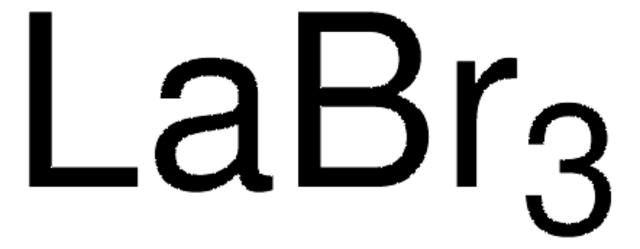450960
Lutetium(III) chloride
anhydrous, powder, 99.99% trace metals basis
Synonym(s):
Lutetium chloride, Lutetium trichloride
About This Item
Recommended Products
grade
anhydrous
Quality Level
Assay
99.99% trace metals basis
form
powder
reaction suitability
reagent type: catalyst
core: lutetium
impurities
≤150.0 ppm Trace Rare Earth Analysis
mp
905 °C (lit.)
density
3.98 g/mL at 25 °C (lit.)
SMILES string
Cl[Lu](Cl)Cl
InChI
1S/3ClH.Lu/h3*1H;/q;;;+3/p-3
InChI key
AEDROEGYZIARPU-UHFFFAOYSA-K
Application
- As a precursor to synthesize chiral bridged lutetium catalyst for asymmetric hydroamination.
- As a starting material to prepare doped lutetium oxide nanophosphors.
- To fabricate scintillation detectors such as lutetium aluminum garnet (LuAG).
accessory
Storage Class Code
11 - Combustible Solids
WGK
WGK 2
Flash Point(F)
Not applicable
Flash Point(C)
Not applicable
Personal Protective Equipment
Regulatory Listings
Regulatory Listings are mainly provided for chemical products. Only limited information can be provided here for non-chemical products. No entry means none of the components are listed. It is the user’s obligation to ensure the safe and legal use of the product.
JAN Code
450960-1G:
450960-5G-PW:
450960-VAR:
450960-BULK:
450960-1G-PW:
450960-5G:
Choose from one of the most recent versions:
Certificates of Analysis (COA)
Don't see the Right Version?
If you require a particular version, you can look up a specific certificate by the Lot or Batch number.
Already Own This Product?
Find documentation for the products that you have recently purchased in the Document Library.
Customers Also Viewed
Articles
Rare earth elements are vital in everyday life worldwide: catalysts in cars, colors in screens, magnets in electronics. Essential for modern living.
Our team of scientists has experience in all areas of research including Life Science, Material Science, Chemical Synthesis, Chromatography, Analytical and many others.
Contact Technical Service











